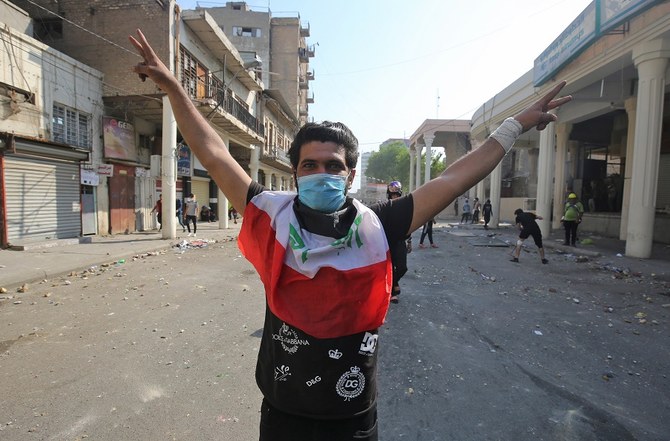
- ARAB NEWS
- 11 Jul 2025

July marked the 40th anniversary of the brutal takeover of power by Saddam Hussein in Iraq. Grainy footage exists showing Saddam nonchalantly puffing on a cigar as the names of senior Baath Party officials were called out, accused of participating in a Syrian-orchestrated conspiracy and escorted out of the assembly.
The new president’s purge saw 22 executed that day, and dozens more were to follow. For the next 24 years, he was the undisputed leader of Iraq, plunging his country into wars, sanctions, isolation and occupation. This legacy sadly survives.
Not all the blame can be placed at the door of this ignominious son of Tikrit but, as each day of the ongoing protests passes and the body count soars past 300, ignoring history and how Iraq reached this point is foolhardy.
Iraqis, particularly those outside of the Kurdish areas, have experienced few moments of calm and normality since Saddam came to power. Over those 40 years, has any other people suffered and endured so much, not just in the Middle East but the world over? Surviving the barbarity of Saddam’s regime alone was bad enough, especially for Iraq’s Kurds and Shiites, who both suffered genocidal assaults, but you can add to that one of the longest wars of the 20th century.
The eight-year Iran-Iraq War decimated the country, reducing it to near-bankruptcy. Two years after the end of that conflict, Iraq invaded Kuwait to trigger the most punitive sanctions ever imposed on a nation state, and ultimately the US-led coalition expelling Iraq’s forces from the Gulf emirate.
The sanctions on Iraq were, for the most part, sanctions on the Iraqi people. The regime survived, even thrived, but the UN sanctions tore the entirety of Iraqi society apart, hitting every single family. Arguably nothing before or since then has been so cataclysmic, altering society at a nuclear level.
The 2003 war did finally see the end of the regime and the sanctions, but the US-UK occupation did not usher in a new golden age of Iraq as the neoconservatives had promised. Iraqis instead saw a new means of plundering the country, with an occupation that failed to protect the people and instead pillaged and wasted the oil-rich state’s most cherished resources and heritage.
The political challenges of 2019 are rooted in that tumultuous and incompetent US rule, under the overlordship of Ambassador Paul Bremer. The farcical constitutional process, the reliance on discredited exile groups, and the embedding and formalization of a sectarian identity-based political system still haunt Iraq today. The two most notorious actions were Order 1 of May 2003, which instituted a mass de-Baathification of the Iraqi system, and Order 2, which disbanded the entire Iraqi military. Those two decisions encapsulated the leitmotif for the US in Iraq: Incompetence and blind self-interest.
The authority of the Iraqi state has yet to be properly reconstituted. Armed sectarian militias still eat away at any sense of a strong state. Bremer and others saw Iraq only as a collection of differing identity groups and chose to govern accordingly, inserting sectarian identity at the heart of the new political order.
The Sunnis felt excluded, leading in part to support for groups like Al-Qaeda and then Daesh. Shiite parties, often backed by Iran, dominated, reaching a nadir with the highly sectarian rule of Nouri Al-Maliki from 2006 to 2014. Today’s protesters, as they are in Lebanon, are determined to dismantle that sectarian legacy, where appointments from top to bottom of ministries and other agencies are made according to identity.
The cake is divided up between differing rapacious fiefdoms, state contracts being shared among them like spoils of battle.
Chris Doyle
The Bremer regime also planted the seeds of the orgy of corruption from which Iraq now suffers. This is not just a bunch of dodgy individuals. It is endemic, and Iraq is ranked the 168th most corrupt country in the world. Despite being blessed with monumental oil resources, Iraq is today importing energy from Iran. About 6.7 million people are in need of humanitarian assistance. If one thing unites Iraqis, it is complete distrust in the system. The cake is divided up between differing rapacious fiefdoms, state contracts being shared among them like spoils of battle. Is it any wonder that Iraqis are demonstrating day after day?
To move forward, Iraq has to throw off the shackles of its past — something the current government looks highly unlikely to do, not least as it resorts to lethal violence. It needs a new political and social contract between the government and its people, fashioning an Iraqi identity free from the ills of bitter sectarianism and foreign interference. The attack on the Iranian consulate in Karbala tells us all you need to know about Iran’s nefarious influence and the machinations of its ringmaster, Qassem Soleimani, the chief commander of Iran’s Quds Force. He may be far wilier than Bremer, but no less self-interested and quite determined not to be shown the exit door.
Only when the jackals from outside stop trying to feed on the Iraqi carcass can this proud nation stand a chance. A new political order based on popular Iraqi consent and buy-in, where everyone has a stake and a chance, must be brought about. It must promote merit above sect, uniting rather than dividing. It must again attract Iraq’s other great lost asset — its human resources — to reverse the decades-long brain drain. At the same time, Iraqi society is in desperate need of an organic, long-lasting healing process to reconcile its constituent parts for the greater good.
Chris Doyle is director of the London-based Council for Arab-British Understanding. Twitter: @Doylech